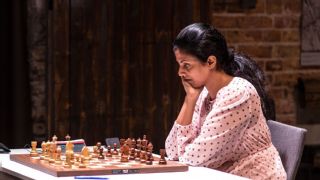|
Chess in India is at a good place: There are young players rising up quickly, like Gukesh D and R Praggnanandhaa; India hosted the Chess Olympiad last year and secured two medals; and it played a big role in staging the recent Global Chess League (GCL). Yet that's only half the picture: women's chess in India lags quite behind the men's game. Koneru Humpy and Harika Dronavalli, two Indian chess greats, agree there is a problem and look at possible solutions. Humpy feels that systemic support, especially effective in China, is missing here and Harika feels there's a lack of the kind of competition among women players that has helped Indian men's chess grow. "I've been playing chess for the past 30 years," says Humpy, speaking to ESPN a few days after the conclusion of the GCL campaign. "Now, when you compare the men, the next generation of players are super talented. There are a lot of players coming up. When it comes to women, it's hard to say. Though we have players like Vaishali, Divya Deshmukh and Savitha Shri, the percentage is very less and if we look at the age factor and the rankings, we are still not competing with Russians and Chinese. I feel we are not focusing on women's tournaments and training girl players. I think if we can identify the right talent and train them, probably we'll get more players. That's my opinion." She and Harika were part of the Mumba Masters in GCL where their team made it to the final and narrowly lost a thriller. "Whoever found success till now," Humpy says, "was more or less due to their individual effort. If you see China, they have a complete sporting system. If one player becomes a world champion, they know that that player will be dropping out at some point. So, they quickly prepare the next batch of players. One of them will shine. We don't have that system here. If a player takes individual effort and finds success, then great. I think that has to change. The federation or the government...they have to keep a focus on women's chess." Harika, medallist at the World Chess Championship and Asian Games, is unsure why there's a gap between men's and women's chess in India. She believes strong competition between the men is indeed helping their game, something the women's game is sorely lacking. "I really don't know the reason," Harika says. "Of course, there's a void and that's clear. Like Humpy said, in general, infrastructure is different for us. Luckily [for the men], there's a heavy competition, which helps them grow. Even for me and Humpy, strong competition between us always continued, so it got better and better, but I think at the women's level, that competition is still less. I don't think it's related to gender bias [development of chess in India]. I see the men and they are also [working] individually, but of course, better infrastructure will be good for both men and women."  "Now, when you are seeing the men, you'll understand that in women's [competitiveness] is less. Now you can see and start focusing on these things and then try to understand how to make it better." Like with any sport, global exposure and playing as many quality tournaments as possible makes a huge difference. Logistical and financial issues can also become factors in the growth and development of women players. Humpy, who once became the youngest woman Grandmaster at 16, says, "If you take a 16-year-old boy, he'll play tournaments continuously. Parents usually can send the boy alone abroad and make him play the matches. Whereas, when it comes to a girl, they might feel restricted. Certain limitations will be there. Financial expenditure could be more if you travel with a girl. And obviously, if a thousand boys play, we can expect a greater number of successes. Participation percentage is less in women's field compared to men. So, it's understandable that the success rate will also be less." Both agree that more women's chess tournaments, especially in India, will provide a boost. Like the Tata Steel Chess India tournament, one of the prestigious annual tournaments in the country, which introduced the women's event last year. India's R Vaishali won the blitz event in the women's section. "Now they have started this Tata Steel women's tournament. All these players are getting the chance to play with the top players. Earlier, when we had to play, we had to get selected first, find ways to go there. Now when you get it in India, it's always comfortable. Playing the Olympiad in India, it's always comfortable for the upcoming generation," says Harika. What's next?Humpy (world no. 5) are Harika (world no. 12) are gearing up to play the Women's Chess World Cup, which begins on July 30 in Baku, Azerbaijan. As top players, which also includes Vaishali, they received first round byes. A good showing here will help in their preparations for the Asian Games, where chess is making a comeback after 13 years. Humpy and Harika are former medallists at the Games -- Humpy won two gold medals in the 2006 edition and Harika bronze in 2010. "We play a lot of tournaments, but the main attraction will be at the Olympics, Asian and Commonwealth Games. That's where the government will look at most of the time. That way it makes the event more special," Humpy says. "I'm happy that I'm able to play," says Harika. 'It was supposed to happen last year and maybe I wouldn't have gotten a chance to play because it was my delivery time. I was really planning how to make it work. I'm happy that I'm getting a chance to play after the postponement. I just want to give my best. And for youngsters, it will be a brilliant opportunity. Now the team members are really young and new to the team events. Asian Games and all are much different to normal team events, circumstances will be different."
|

